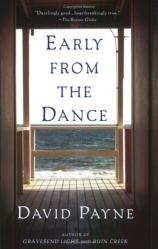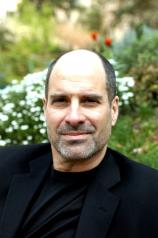Reading Group Guide
Discussion Questions
Early From the Dance: A Novel

1. What role does memory play in the action of David Payne's novel? For Adam and Jane, the novel's principal characters, what special risks and consequences attend the act of remembering? And what are its end results? Do solace and understanding finally outpace devastation and regret?
2. In the particular psychological realm of Early From the Dance, the ghosts of the past are omnipresent and enduring, forever pulling David Payne's narrators, with the inevitability of gravity, into a series of lush memory-scapes. For Adam, the past reaches out immediately, in the novel's opening paragraphs, "like the long arm of some ghostly truant officer," demanding "an accounting" he is reluctant, at least initially, to make. What is he afraid of? From what has he been running for thirteen years?
3. What about Jane? What is her response to the rush of memories prompted by A.'s unexpected return? Describe Jane's journey beyond what she calls "the gate of Memory Lane." What is her emotional state at the beginning of the novel, and where have her remembrances taken her by the culmination of "The Deep, Deep Sea," the book's third and final section?
4. What sort of a man is Cleanth Faison? Discuss A.'s first description of him in the second chapter of "The Lost Colony." In this brief but telling initial character sketch—coupled with the revelatory dinner-and-cocaine extravaganza that follows—what clues and signifiers about Cleanth does Payne drop into the mix?
5. What were your reactions to Cleanth, and how did they shift as the novel progressed?
Can we make the argument that Cleanth is a type of father figure to A.? Or a kind of cautionary doppelganger? Is he A.'s philosophical mentor? Explain.
6. How would you summarize Cleanth's effect on Adam? Was Adam simply blinded by the beautiful lie of a virtuoso confidence man? Or did Adam learn anything of tangible value under Cleanth's tutelage? Can we make arguments for both?
7. Betrayal wears several faces in Early From the Dance, and its legacy is enduring and severe. Who betrays, and who is betrayed?
8. How could we argue that, according to the emotional calculus of this novel, virtually every single character ends up playing both roles, betrayer and betrayed, in turn? Who suffers most? Who is most culpable? Who, if anyone, is redeemed?
9. Discuss the significance and layered meanings informing the title of Payne's novel. What is the dance? What metaphors and associations are at play here?
10. David Payne's prose is widely admired by critics and readers. Early From the Dance in particular holds a kind of cult, "favorite-book" status among many readers for whom the novel captures the intimate rhythms and textures of their own private late adolescences and early adulthoods. What is it about Payne's writing that struck you the most? What specific qualities/techniques in his writing invite such deep identification from readers? How would you describe his style to a friend?
11. Consider Payne's unusual use of dialogue to shape the tone and pace of Jane and A.'s intersecting narratives. What is the effect of the flowing manner—with very few if any paragraph breaks—by which conversations are conveyed throughout the novel?
12. Talk about Early From the Dance in the context of David Payne's other novels—Confessions of a Taoist on Wall Street, Gravesend Light, and Ruin Creek. What themes, images, situations, and/or regional settings emerge and then recur in his fiction? [For instance, how does Cleanth's manic depression compare with Reed Madden's struggles with bipolar disorder in Gravesend Light?]
13. All of David Payne's novels, in one way or another, explore the complex ties that bind a father to his son. How does the father-son dynamic—between Adam and Clay, between Cary and his alcoholic father, and even between Adam and Cleanth—function in Early From the Dance?
14. At one point in the novel, a rueful Adam muses that "the great lesson of [his] life" was in discovering "how the dark power of a lie breaks everything, even the brightness of love." What does he mean? Whose lie(s)? How does this lesson operate at different points and in different quadrants of Adam's life, whether with regard to Cary and Jane, Cleanth and Morgan, or his father and Eleanor Rosenberg? Considering the novel's resolution, does the truth of the lesson finally bear out?
15. Describe the change Adam undergoes over the course of his summer with Cleanth and Morgan, from the very first exchange he has with Cleanth after his euphoric run along the beach, to the fateful weekend of the boar hunt. Looking back, A. considers that the summer at the Lost Colony may indeed have been "the place I lost myself." But at the time, he tells us, "it felt more like discovery." What is Payne up to here? What is lost for Adam—and what seems to have been discovered?
16. Under the dazzling, manic tutelage of Cleanth, "the high priest of lostness," how does Adam begin to see himself, and the mechanics of the world around him? What are the tenets of Cleanth's "Life Poker"? What possibilities for enlightenment, and what dangers, does this game seem to afford?
17. Possibly the most complex and certainly the most heartbreaking character in Early From the Dance is Morgan. What is her story? After the hunting expedition, what does the future seem to hold for Morgan?
18. How do the epigraphs by Eliot, Wyatt, and Conrad speak to the themes and concerns of Payne's story?
19. Revisit Jane's loaded account of the mushroom trip in Part I, "Stormy Monday." What's going on here? As the drug-addled action of the scene unfolds, what do we learn about the nature of each of the three players in Payne's love triangle? And how do these discoveries color the remainder of the novel? For instance, what begins to be illuminated about Cary's emotional/mental struggles in this passage? Who/what is "the beast"? And how do Jane's colorful "aural" perceptions of Adam and Cary presage the corresponding colors and emotions that dominate A.'s troubling dream about eggs, osprey, and wild boars later in the novel?
20. Toward the end of the "The Deep, Deep Sea," on the roadside just before she finds Adam at the beach, Jane has an epiphany. "That buried girl in me…came back from the dead," Jane tells us. Who is the "tobacco girl" referred to here? What has Jane reclaimed in this scene? What is the final tone of the novel?
21. What is the story behind Clay Jenrette's novel, Rubber Man? How has it reverberated through the course of A.'s own life? To what degree has Adam followed in his father's footsteps? Has Adam himself been a "rubber man"? What does this mean?
22. Each of the characters in the novel grapples in his or her own way with shifting notions of identity. Discuss the various ways in which Early From the Dance considers the question of what defines one's own "reality"—whether in terms of class, geography, gender, philosophy, or family. How is this question resolved for each character? To what degree does identity, in Payne's story, remain unresolved and fluid?
Early From the Dance: A Novel
- Publication Date: October 28, 2003
- Paperback: 464 pages
- Publisher: Plume
- ISBN-10: 0452282802
- ISBN-13: 9780452282803







